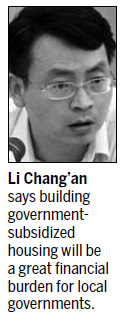Opinion
Affordable housing strains local govts' coffers
By Li Chang'an (China Daily)
Updated: 2011-01-14 09:45
 |
Large Medium Small |
The central government's ambition of building more government-subsidized apartments nationwide this year will truly test local governments' finances.
The country plans to build 10 million subsidized apartments in 2011, almost twice as many as last year's target of 5.8 million.

The total investment by all levels of government will increase to 1.4 trillion yuan ($212 billion), or 20 percent of the country's total annual real estate investment.
But it will be a great financial burden for local governments, which will likely fail to meet the target because of a lack of funds.
The central government invested 80.2 billion yuan in subsidized apartments last year, Ministry of Housing and Urban-Rural Development figures showed.
The central government will likely increase its investment to 100 billion yuan this year. Another 100 billion will come from the Housing Provident Fund, a compulsory social security program requiring all employees to make long-term deposits since 1994.
But local governments will still need to raise the remaining 1.2 trillion yuan.
This will prove challenging, as most local governments have been in dire financial straits for years.
The debts of local governments of 18 provinces totaled 2.8 trillion yuan in 2009, National Audit Office figures showed.
| ||||
The central government's push to construct subsidized housing will also significantly reduce local governments' incomes, as such housing is not profitable.
In 2009, the country generated a total of 1.42 trillion yuan from land leases. The income accounted for a stunning 50 to 60 percent of some cities' total revenues.
Practically no city has reached affordable housing construction targets in the past seven years.
That includes the wealthier metropolises, such as Beijing, Shanghai, Zhejiang's provincial capital Hangzhou and Hubei's provincial capital Wuhan.
The central government must step up its financial support of local governments and more private funds should be sought.
The author is a senior research fellow specializing in public policy at the University of International Business and Economics.



